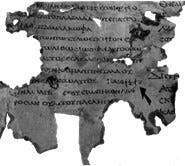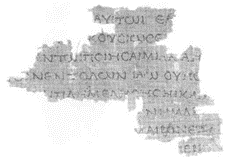“I am PIPI your God”: God’s Hebrew Name in the Greek Old Testament
Guest Post by Dr. Clint Burnett
“I am PIPI your God”: God’s Hebrew Name in the Greek Old Testament
By Dr. Clint Burnett
According to Exodus, the God of Israel revealed his covenant name to Moses at the burning bush (Exod 3:13-15), which consists of four Hebrew consonants, יהוה (YHWH).[i] You find this in paleo-Hebrew such as the so-called Ketef Hinnom amulets, Ketef Hinnom dating to the First Temple period, in the Dead Sea Scrolls from the Second Temple period, and various manuscripts of the Hebrew Scriptures such as Leningrad Codex from the medieval period.
During the Hellenistic period, the Hebrew Scriptures were translated into Greek. The earliest, most complete Greek manuscripts of Exodus are part of the Christian Septuagint (LXX), the Greek Old Testament, and date to the fifth century CE. The Christian scribes who copied and edited the LXX rendered God’s covenant name with the Greek noun, κύριος (kyrios), the same title that the earliest Christians used for Jesus.[ii]
The relatively late date of these LXX manuscripts raises the question: did the scribes who initially produced the Christian Greek Old Testament copy accurately the text that was before them? Is the use of kyrios to translate YHWH a Jewish practice that dates back to the time of Jesus and Paul?[iii] Or were there other ways of rendering the divine name into Greek?
The answers to these questions are, well, complicated.
A few non-Christian manuscripts, mostly fragmentary, of the Greek Old Testament have survived. These date to the first century BCE–first century CE and none of them evince the translation of YHWH with kyrios! In fact, some manuscripts retain God’s covenant name in Hebrew even in the middle of a Greek text such as the Minor Prophets scroll found in a cave near the Dead Sea in Israel (see Image 1).[iv]
Image 1: Column 18 from 8ḤevXIIgr, a Greek manuscript from Naḥal Ḥever that dates between 50 BCE and 50 CE (© Wikimedia Commons: Public Domain).[v]
Other manuscripts reveal that Jewish scribes translated God’s covenant name with the Greek letters Ιαω (Iaō), which appears to be a phonetic spelling of YHWH that was known even among pagans (see Image 2).[vi]
Image 2: 4QpapLXXLevb of 4Q120, a first-century BCE fragmentary copy of Leviticus in which the scribe rendered God’s covenant name in Lev 4:27 with ΙΑΩ (Iaō) (© Wikimedia Commons: Public Domain).
The testimony of Jerome and probably Origen point to evidence that some Jewish scribes transliterated YHWH with the Greek letters ΠΙΠΙ (PIPI).[vii] That is a transliteration that attempts to render the Hebrew name for God, not phonetically as with Iaō, but visually, to use Greek letters that look like the Hebrew יהוה (YHWH).
This reluctance of Jewish scribes to translate YHWH into Greek, by retaining the Hebrew, using a phonetic spelling of Iaō, or adopting a clumsy transliteration into PIPI, stems from the prohibition among first-century Jews forbidding the pronunciation of God’s covenant name, which Lev 24:16 (LXX) and the Dead Sea Scrolls, among other examples, attest. The LXX of Lev 24:16 reads, “Now let the one who names the name of kyrios certainly be executed.” Note, such a prohibition does not appear in the Hebrew text, which prescribes blaspheming God’s covenant name only!
Some of the Jews responsible for the sectarian texts among the Dead Sea Scrolls took this prohibition so much to heart that they did not write God’s covenant name but replaced it with four dots, * * * *, representing YHWH in a practice known as tetrapuncta![viii]
Finally, although hard evidence for the translation of YHWH with kyrios is lacking among surviving manuscripts prior to the LXX, we should not interpret this as evidence of absence. The New Testament documents support the proposal that some Jews used kyrios for YHWH in their reading of the Greek Old Testament. For example, in 1 Cor 8:5-6, Paul composes a modified version of Deut 6:4, known as the Shema after the first Hebrew word of the text, שְׁמַ֖ע (shma), “Hear, Israel, YHWH our God, YHWH is one,” as he acknowledges the semi-existence of other semi-divine beings:
For as there are so-called gods, whether in heaven or on earth, as there as many gods and many lords. But for us there is one God, the Father from whom are all things and we exist for him, and one Lord, Jesus Christ through whom are all things and we exist through him.
In this modification, Deut 6:4’s God is “the Father” and the Lord is “Jesus Christ.” This exegetical move works only if the rendering of YHWH with kyrios was known among the earliest Christ-confessors, in particular those from Corinth.
Thus, some Jews composing and copying the Greek Old Testament retained God’s covenant name in Hebrew, other Jews translated YHWH with Iaō, still others transliterated it with PIPI, and probably some Jews rendered God’s covenant name with kyrios.
In short, the appearance of God’s covenant name in ancient manuscripts of the Greek Old Testament documents was diverse, as Judaism itself was diverse. I suspect that this diversity and the theological presuppositions underpinning it may have been a contributing factor to why some Jews accepted Jesus’s divinity (provided that the earliest Christology was one of divine Christology), while others did not.
For more on God’s covenant name see:
Fitzmyer, Joseph A. “The Semitic Background of the New Testament Kyrios Title.” Pages 115-142 in A Wandering Aramean: Collected Aramaic Essays. Missoula: Scholars Press, 1979.
Myer, Anthony R. Naming God in Early Judaism. Leuven: Leiden: Brill, 2022.
Check out Clint’s blog Ad Fontes, his podcast biblepigraphy, and his book Studying the New Testament Through Inscriptions: An Introduction (Peabody, MA: Hendrickson, 2020).
[i] All translations of ancient sources are by Clint Burnett.
[ii] Beginning in the second century CE, Christians scribes began to abbreviate names associated with God such as theos, kyrios, etc. in a practice known as nomina sacra. In the process, they wrote the first and last Greek letters of the name with a line above them. For more information see Larry W. Hurtado, The Earliest Christian Artifacts: Manuscripts and Christian Origins (Grand Rapids: Eerdmans, 2006), 95-134.
[iii] The answers to these questions have major christological implications. If the earliest Christ-confessors, most of whom were Jews or pagan converts to Judaism, called Jesus by God’s covenant name, then they were identifying Jesus with and/or as the God of Israel. If first century Jews did not use kyrios to translate YHWH, then the early Christian use of kyrios for Jesus distinguished the latter from the former.
[iv] P.Fouad 266 (Rahlfs 848); P.Oxy 50.3522; Zaki Aly and Ludwig Koenen, eds., Three Roles of the Early Septuagint: Genesis and Deuteronomy (Bonn: Rudolf Habelt, 1980), 5-6, plate 24, col 34; plate 26, col 39; plate 32, col 53.
[v] For more information see Emanuel Tov, The Greek Minor Prophets Scroll from Naḥal Ḥever (8ḤevXIIgr) (The Seiyal Collection I), DSD 8 (Oxford: Clarendon Press, 1990).
[vi] Diododurs Siculus 1.94.2. For more information see Frank Shaw, Earliest Non-mystical Jewish Use of Ιαω (Leuven: Peeters, 2014).
[vii] Origen, On Psalm 2:1-2 (Migne, Patrologia Graeca 12.1104-1005); Jerome, To Marcellum 25 ll.13-17 (Corpus Scriptorum Ecclesiasticorum Latinorum 54).
[viii] For an example of the tetrapuncta follow this link to the digitized version of the Community Rule and look at column 8 of the document.






The Hebrew name YHVDH is pronounced "Yehudah" in Hebrew. YHVDH and YHVH are almost similar except for the letter Dalet in YHV(D)H, a basis in which the pronunciation of YHVDH is close or with similar pronunciation of YHVH.
Also the name Jesus, it is a transliteration from the Aramaic name "Yeshua" which is from the Hebrew name YHVSA that pronounced as "Yehoshua". "Yeho" is shortened form of the name of God and Shua means "Salvation".
Yehudah and Yehoshua were not prohibited to pronounce. So, there is a clue on how to pronounce the name of God. Which is the closest pronunciation to YHVH that sounds similar to Yehudah and Yehoshua? Apparently the pronunciation of "Iao" is too far as well as PIPI, and Yahweh. Except for the pronunciation of YEHOVAH in Hebrew (YHVH)! This is the closest to the pronunciation of Yehudah (YHVDH) and Yehoshua (YHVSA). The English pronunciation of Jehovah can be considered as a direct transliteration of the Hebrew pronunciation "Yehovah".
(Jesus is not a direct transliteration of the name Yehoshua so it cannot be read as Jehoshua. Jesus is a transliteration from the Latin "Iesus", from the Greek "Iesous" a transliteration of the Aramaic name "Yeshua" a shortened form of the Hebrew name "Yehoshua").
John 5:43, ESV: "I have come in my Father's name, and you do not receive me."
Unless you don't believe in Jesus and don't trust God who gave assurance to use His name: Exodus 3:15
"This is may name forever.. for genaration to generation".
Meaning it will not be lost and cannot be replaced by another title or name.
The ancient generation of Israelites, to our generation and the next generations was prophesied that the name of God Jehovah would be great among them in all the earth forever.
Isaiah 48:7; Malachi 1:11; Acts 15: 14-21; Ezekiel 12:28; Isaiah 55:10,11.